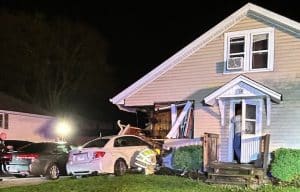R-T barred from Roider jury selection
Jury selection began Monday morning at the Monroe County Courthouse for the murder trial of Kyle Roider, but the press, and therefore the public, was barred access to the proceedings.
When the Republic-Times showed up shortly before the first round of jury selection for the Roider case at 9 a.m., the paper was told by Monroe County Circuit Clerk Lisa Fallon that “the court” said the press would not be allowed to watch jury selection due to COVID-19 concerns. The courtroom was too small to adequately social distance everybody, she said, and only those “essential” to the proceedings would be allowed in. Judge Julia Gomric is presiding over this case.
The press has a First Amendment right of access to court proceedings and records, as precedent has shown. This right is not absolute; it is a mere presumption of access.
If court proceedings of a similar nature are typically open to the public, which jury selection is, this “tradition of accessibility” applies, per precedent set in the Richmond Newspapers, Inc. v. Virginia case. Also set by precedent, right of access should be granted provided “public access plays a significant positive role in the functioning of the particular process in question.”
If there is a higher, prevailing interest to closing the courtroom, the right to access may be overruled.
The precedent set in Press-Enterprise Co. v. Superior Court of California states that jury selection is an open public trial proceeding, but may be closed if an “overriding interest” is shown.
“Openness enhances both the basic fairness of the criminal trial and the appearance of fairness so essential to public confidence in the criminal justice system,” the U.S. Supreme Court ruling states. “Public proceedings vindicate the concerns of the victims and the community in knowing that offenders are being brought to account for their criminal conduct by jurors fairly and openly selected. Closed proceedings, although not absolutely precluded, must be rare, and only for cause shown that outweighs the value of openness.”
In this case, the Republic-Times understands pandemic-related precautions prove to be the listed “overriding interest.” The precedent said that if an overriding interest is shown, “open proceedings may be satisfied later by making a transcript of the closed proceedings available within a reasonable time.”
When Republic-Times editor Corey Saathoff emailed Fallon about the press being barred access and asked for either transcripts or a Zoom link option to jury selection – citing how the court website offers a “public access terminal set up in the law library at the courthouse” for people without Zoom access at their residences to participate in their proceedings – she issued the following response:
“I am following the instruction of the court. We have the entire courtroom meticulously laid out for social distancing in response to an overabundance of caution for all involved due to COVID and especially the Delta variant. The Zoom links provided on my website are occurring with Judge Kujawa for ongoing status and case management conferences for Monday civil cases. Friday’s Zoom link is for case management conferences on criminal cases.
We do not have the technology available in the courtroom to do the entire courtroom and all the proceedings. They are done with the Judge’s laptop on the bench and any parties logging into the meeting remotely.”
The reporter covering this case is fully vaccinated and agreeable to wearing a mask.
The Republic-Times has attended previous court proceedings in the Roider case that were not sealed to the public, set in the same courtroom where jury selection is taking place. No seats were roped off, yet there were very few people in attendance.
The jurors were selected by Tuesday afternoon. For an up-to-date account of the proceedings, click here.
Fallon said they had two sections of 45 or more potential jurors. The voir dire process began Monday morning with the first group, with the defense and prosecution having the opportunity to strike, or dismiss, potential jurors either per cause or peremptory challenges. Each side got seven peremptory strikes, in which they did not have to provide a reason for striking, Monroe County State’s Attorney Lucas Liefer told the Republic-Times last week.
For the trial, Fallon said certain sections of the trial benches would be marked off to ensure social distancing, and that the designated seats will be on a “first-come, first-serve” basis.
Roider, 33, is charged with first degree murder and aggravated battery in connection with the death of 35-year-old Steven Becker, whose body was found Jan. 11, 2019 in the basement of the house Roider was inhabiting at 107 N. Church Street in Waterloo. He has entered not guilty pleas to both charges.
Becker was shot in the head and leg, the former being noted as the cause of death in his autopsy.
UPDATE: On Aug. 27, 2021, a Monroe County jury found Kyle Roider not guilty of first-degree murder and not guilty of aggravated battery with a firearm. These charges were brought against Roider in connection with Steven Becker’s January 2019 death.






